| How was life in
Theriso in former times?
|
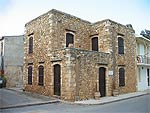
Venizelos'
house
in Mournies
|
| Times were difficult in the old
days before Venizelos came to power. Actually, Venizelos does not at all
come from Crete, as his father came from Kythira. The father came to
Chania as a trader, and he was apparently very capable because he opened a
shop, one of the finest in Chania in those days. Moreover, he made so good
a profit that he was able to build a house in Mournies.
|
|
|
| Venizelos' mother, on the other
hand, was from Theriso. She came of the Ploumidakis family. Venizelos'
father fell in love with her, they married and had the son Lefteris [ =
Eleftherios Venizelos ].
|
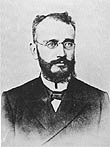
|
Lefteris was said to be
something of a daredevil as a child but calmed down eventually. He
finished middle school in Chania and after that he became a law student at
the University of Athens where he got his diploma as a lawyer. After his
graduation he worked as a lawyer here in Chania for a couple of years.
|
| At that time the Cretans struggled to get their own government but their
greatest wish was to be united with the free Greece, because they were
subjected to many atrocities from the Turks. King George in Athens
therefore decided in concert with England, France, Russia and Italy that
his second son, whose name was also George, was to be sent to Crete as
high commissioner of the island, until it could become united with the
rest of Greece.
|
| The rebels under the leadership
of Lefteris, had previously occupied Akrotiri and driven the Turks out
from there. The Christians in the village of Pithari was at that time
under an obligation always to leave a pithari (big
earthenware jar) with water so that the Turks and their mules at all
times could have a drink of water, because then, as you know, all
transport was carried out on animal-back. In this way the village got its
name.
|
| Well, in December 1899 king
George sent his son to the island, and an independent government was
formed, Kritiki Politeia, in which Lefteris became minister of justice.
|
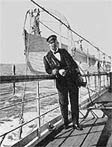
|
| But in reality the high
commissioner was not interested in a unification with Greece, because he
himself wanted to become "king of Crete". He said something but
then he acted against it and this conduct led to disagreements between him
and Venizelos. For that reason, Lefteris sent in his resignation, but the
high commissioner wished to have the pleasure of dismissing him, so not
until Lefteris' second request, did George sign the resignation in 1901. |
|
|
|
Prince
George
on his way to Crete
|
| At the beginning of 1905,
Venizelos travelled on foot throughout Crete, and in a few months he
managed to convince the Cretans that they ought to rise in rebellion in
order to remove the high commissioner and the last of the Turks, so Crete
at long last could become united with Greece.
|
| Although we Cretans are known
for our many rebellions - that is why they call us rebels - it was
difficult for him to convince people in many places, because they believed
and hoped that George would save Crete and unite the island with the rest
of Greece. They almost took him for a god, but as I said before, George
had other plans - he wanted to be king of Crete.
|
| Did you meet Venizelos?
|
|
| Yes, I met him several times,
even though I was not born until 1912. As I said before, Venizelos was
very fond of the village because it was his mother's native soil.
Moreover, he had to find a suitable place for headquarters where he could
gather all the many rebels.
|
| He first tried to find a place
down in the plains but people were afraid, because if the rebellion failed,
they would be punished by the high commissioner. So he went on to Malaxa
but also here the answer was no. He went to Kambi but they did not want
him to use the place as headquarters either.
|
| He finally chose Theriso which
was a splendid place because it is close to Chania and there were plenty
of hiding places in the mountains. He arrived one late afternoon together
with the two other rebel leaders, Foumis and Manos.
|
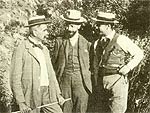
Foumis, Venizelos
and
Manos
|
| He went immediately to see the
village leader who asked him, "Lefteris, what are you doing here at
this time of day?" He said that they intended to use the village as
headquarters for their rebellion. The mayor thought the matter over
because they ran the risk of getting the monarchy down on them, but
finally he said, " Lefteris, let us sleep on it. I am tired now
because I have been in the field all day. Tomorrow, when we have clear
heads again, we can continue our discussion." |
|
|
|
|
|
| Well, they had something to eat and when they were about to turn in, four unmarried
girls were sent for, to sleep with the visitors. Then the leader summoned
the village council - my grandfather, Papadogiorgis, also participated - and told them about Venizelos' plans
and that they must make a decision in order to give an answer to Venizelos.
|
| They agreed that Venizelos
could have his headquarters in the village even though they were afraid
that George's troops would destroy the village, if they failed. They had
already three times experienced, that the Turks had destroyed their
village and they had been forced to take refuge in the mountains with
their animals.
|
| Venizelos replied to them that
the odds were that the village would be destroyed again if the rebellion
failed. To this, the village leader answered, "Well, even though they
would burn down the village, we still have our honour and pride intact."
Another person interposed that they were used to living in the mountains
anyway, and if they were killed it would cost the government a fortune to
hold the memorial ceremonies for all of them. |
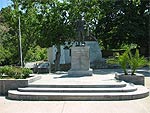
|
|
|
|
|
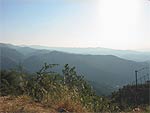 |
Gradually, Lefteris made the
Cretans take his side and one beautiful morning in 1905, on the 10th of
March, 1.500 rebels arrived at this village. They came on foot from all
parts of Crete. The high commissioner sent a telegram saying that they
were to lay down their arms, but in vain. Therefore he ordered 300 mounted
Italian policemen - because at that time the police was Italian, you see -
to ride to Theriso from the neighbouring village of Meskla and put down
the rebellion. But because there were rebels everywhere, they had to give
up getting to the village. After a couple of unsuccessful attempts where
two policemen were shot, the rest pulled back. |
|
|
|
|
| At one time Venizelos placed
himself onto the hill over there. He shouted in a megaphone that he wanted
to speak to the leader. The head of police accepted, so Venizelos went to
him and told him that they did not intend to harm them. They just wanted
Crete to be united with Greece.
|
| Eventually it became impossible
for George to continue as high commissioner. He realized that the Cretans
were against him and one night he left Chalepa. Gradually, the rest of the
Turks went away too, and once Venizelos had come to power, it did not take
long before the island was united with Athens, well yes, with the whole of
Greece.
|
|
* * * |
|
|
|
|
|
|
|
| Venizelos was an intelligent
man so he was elected as prime minister three times for a 4-year period.
He served in World War I against the Germans and the Bulgarians. At that
time, Northern Greece was still occupied by the Bulgarians and the Turks,
but Lefteris liberated large territories. Times were difficult because
Greece was at war for 10-12 years.
|
| In 1922 Eleftherios Venizelos
went into opposition and Gounaris and king Constantine came into power.
They called on people to vote for them, because, as they said, "Venizelos
is only interested in war. Your sons have now been soldiers for 10 years,
so vote for us that your sons can return." That is why the Greeks did
not vote for Venizelos and he lost the election. But once the king and
Gounaris had taken office, they continued the war all the same.
|
| Venizelos had entered into an
agreement with the Europeans, and with the help of England and France he
managed to liberate large parts of Greece.
|
| Furthermore, Venizelos
negotiated that Greece was also to have Constantinople. But because the
king and his government continued the war, the Europeans turned their back
on us and we lost about 500.000 soldiers whom the Turks butchered as sheep.
It is also the reason why Turkey occupied Asia Minor - which was inhabited
by so many Greeks that it was a veritable miniature Greece - and drove the
Christians out of Turkey.
|
| How did you get to Chania
in the old days?
|
|
| When we were going to Chania in
the old days, we went through Mournies because the gorge was impassable.
At the present side road towards Panagia, we turned aside and went on down
over Mournies.
|
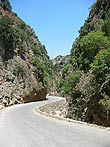
|
Even under Venizelos, we tried
to make the gorge passable but it was a difficult piece of work and,
moreover, very costly. Fortunately, Venizelos' rich wife gave us a grant
of 300.000 drachmas which was a great deal of money in those days. We
managed to make a passage in the gorge so a mule could pass through. At
that time - it was in the mid-twenties - nobody dreamed of driving a car.
In Chania and the lowlands all transport was still carried out by donkey
and horse carriages. The gorge was not opened for cars until 1963.
|
| It was a great advance that the
mules were able to get on faster, but man always wants more so it did not
take long before we also wanted cars, and now almost everybody in the
country have a car. At first we levelled the road with crushed pebbles
because there is not much earth in the area. It is washed away by the
water.
|
| My café existed even under the
Theriso rebellion, and as many of the leading resisters held their
meetings here, I call the café "I Edra" (Headquarters). |
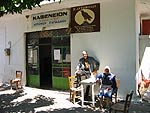
|
|
|
|
|
|
|
|
|
![]()

